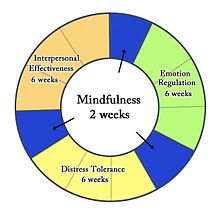
Back علاج سلوكي جدلي Arabic Диалектическа поведенческа терапия Bulgarian Teràpia dialèctica de la conducta Catalan Dialektisch-Behaviorale Therapie German Dialektike behaviorisma terapio Esperanto Terapia dialéctica conductual Spanish Dialektinen käyttäytymisterapia Finnish Thérapie comportementale dialectique French טיפול דיאלקטי התנהגותי HE Dialektikus viselkedésterápia Hungarian

| Part of a series on |
| Mindfulness |
|---|
 |
|
|
Dialectical behavior therapy (DBT) is an evidence-based[1] psychotherapy that began with efforts to treat personality disorders and interpersonal conflicts.[1] Evidence suggests that DBT can be useful in treating mood disorders and suicidal ideation as well as for changing behavioral patterns such as self-harm and substance use.[2] DBT evolved into a process in which the therapist and client work with acceptance and change-oriented strategies and ultimately balance and synthesize them—comparable to the philosophical dialectical process of thesis and antithesis, followed by synthesis.[1]
This approach was developed by Marsha M. Linehan, a psychology researcher at the University of Washington. She defines it as "a synthesis or integration of opposites".[3] DBT was designed to help people increase their emotional and cognitive regulation by learning about the triggers that lead to reactive states and by helping to assess which coping skills to apply in the sequence of events, thoughts, feelings, and behaviors to help avoid undesired reactions. Linehan later disclosed to the public her own struggles and belief that she suffers from borderline personality disorder.
DBT grew out of a series of failed attempts to apply the standard cognitive behavioral therapy (CBT) protocols of the late 1970s to chronically suicidal clients.[3] Research on its effectiveness in treating other conditions has been fruitful.[4] DBT has been used by practitioners to treat people with depression, drug and alcohol problems,[5] post-traumatic stress disorder (PTSD),[6] traumatic brain injuries (TBI), binge-eating disorder,[1] and mood disorders.[7][3] Research indicates that DBT might help patients with symptoms and behaviors associated with spectrum mood disorders, including self-injury.[8] Work also suggests its effectiveness with sexual-abuse survivors[9] and chemical dependency.[10]
DBT combines standard cognitive-behavioral techniques for emotion regulation and reality-testing with concepts of distress tolerance, acceptance, and mindful awareness largely derived from contemplative meditative practice. DBT is based upon the biosocial theory of mental illness and is the first therapy that has been experimentally demonstrated to be generally effective in treating borderline personality disorder (BPD).[11][12] The first randomized clinical trial of DBT showed reduced rates of suicidal gestures, psychiatric hospitalizations, and treatment dropouts when compared to usual treatment.[3] A meta-analysis found that DBT reached moderate effects in individuals with BPD.[13] DBT may not be appropriate as a universal intervention, as it was shown to be harmful or have null effects in a study of an adapted DBT skills-training intervention in adolescents in schools.[14]
- ^ a b c d Chapman, AL (2006). "Dialectical behavior therapy: current indications and unique elements". Psychiatry (Edgmont). 3 (9): 62–8. PMC 2963469. PMID 20975829.
- ^ "An Overview of Dialectical Behavior Therapy – Psych Central". May 17, 2016. Retrieved January 19, 2015.
- ^ a b c d Linehan, M. M.; Dimeff, L. (2001). "Dialectical Behavior Therapy in a nutshell" (PDF). The California Psychologist. 34: 10–13.
- ^ Linehan, Marsha M. (2014). "Research on Dialectical Behavior Therapy: Summary of Non-rct Studies" (PDF). guilford.com (2nd ed.). Guilford Press. Archived from the original (PDF) on October 10, 2017. Retrieved December 11, 2016.
- ^ Dimeff, LA; Linehan, MM (2008). "Dialectical behavior therapy for substance abusers". Addict Sci Clin Pract. 4 (2): 39–47. doi:10.1151/ascp084239. PMC 2797106. PMID 18497717.
- ^ "What is Dialectical Behavior Therapy (DBT)?". Behavioral Tech. Retrieved November 30, 2017.
- ^ Janowsky, David S. (1999). Psychotherapy indications and outcomes. Washington, DC: American Psychiatric Press. pp. 100. ISBN 978-0-88048-761-0.
- ^ Brody, Jane E. (May 6, 2008). "The Growing Wave of Teenage Self-Injury". The New York Times. ISSN 0362-4331. Retrieved December 24, 2022.
- ^ Decker, S.E.; Naugle, A.E. (2008). "DBT for Sexual Abuse Survivors: Current Status and Future Directions" (PDF). Journal of Behavior Analysis of Offender and Victim: Treatment and Prevention. 1 (4): 52–69. doi:10.1037/h0100456. Archived from the original (PDF) on December 29, 2010.
- ^ Linehan, Marsha M.; Schmidt, Henry III; Dimeff, Linda A.; Craft, J. Christopher; Kanter, Jonathan; Comtois, Katherine A. (1999). "Dialectical Behavior Therapy for Patients with Borderline Personality Disorder and Drug-Dependence". American Journal on Addictions. 8 (4): 279–292. doi:10.1080/105504999305686. PMID 10598211.
- ^ Linehan, M. M.; Armstrong, H. E.; Suarez, A.; Allmon, D.; Heard, H. L. (1991). "Cognitive-behavioral treatment of chronically parasuicidal borderline patients". Archives of General Psychiatry. 48 (12): 1060–64. doi:10.1001/archpsyc.1991.01810360024003. PMID 1845222.
- ^ Linehan, M. M.; Heard, H. L.; Armstrong, H. E. (1993). "Naturalistic follow-up of a behavioural treatment of chronically parasuicidal borderline patients". Archives of General Psychiatry. 50 (12): 971–974. doi:10.1001/archpsyc.1993.01820240055007. PMID 8250683.
- ^ Kliem, S.; Kröger, C. & Kossfelder, J. (2010). "Dialectical behavior therapy for borderline personality disorder: A meta-analysis using mixed-effects modeling". Journal of Consulting and Clinical Psychology. 78 (6): 936–951. CiteSeerX 10.1.1.456.8102. doi:10.1037/a0021015. PMID 21114345.
- ^ Harvey, Lauren J.; White, Fiona A.; Hunt, Caroline; Abbott, Maree (October 1, 2023). "Investigating the efficacy of a Dialectical behaviour therapy-based universal intervention on adolescent social and emotional well-being outcomes". Behaviour Research and Therapy. 169: 104408. doi:10.1016/j.brat.2023.104408. ISSN 0005-7967. PMID 37804543.
© MMXXIII Rich X Search. We shall prevail. All rights reserved. Rich X Search